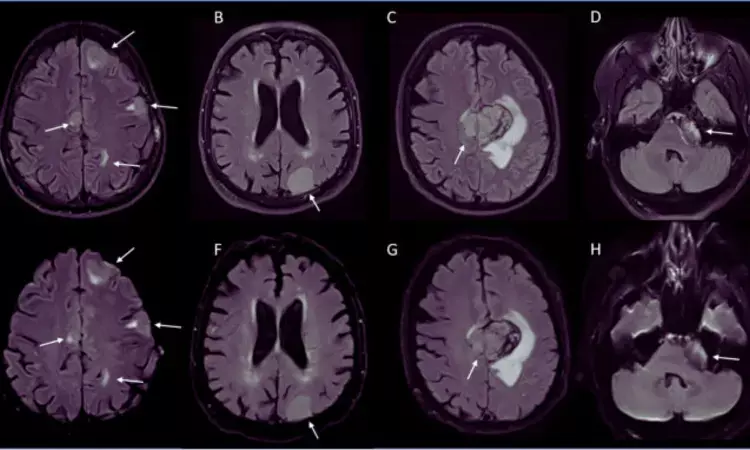- Home
- Medical news & Guidelines
- Anesthesiology
- Cardiology and CTVS
- Critical Care
- Dentistry
- Dermatology
- Diabetes and Endocrinology
- ENT
- Gastroenterology
- Medicine
- Nephrology
- Neurology
- Obstretics-Gynaecology
- Oncology
- Ophthalmology
- Orthopaedics
- Pediatrics-Neonatology
- Psychiatry
- Pulmonology
- Radiology
- Surgery
- Urology
- Laboratory Medicine
- Diet
- Nursing
- Paramedical
- Physiotherapy
- Health news
- Fact Check
- Bone Health Fact Check
- Brain Health Fact Check
- Cancer Related Fact Check
- Child Care Fact Check
- Dental and oral health fact check
- Diabetes and metabolic health fact check
- Diet and Nutrition Fact Check
- Eye and ENT Care Fact Check
- Fitness fact check
- Gut health fact check
- Heart health fact check
- Kidney health fact check
- Medical education fact check
- Men's health fact check
- Respiratory fact check
- Skin and hair care fact check
- Vaccine and Immunization fact check
- Women's health fact check
- AYUSH
- State News
- Andaman and Nicobar Islands
- Andhra Pradesh
- Arunachal Pradesh
- Assam
- Bihar
- Chandigarh
- Chattisgarh
- Dadra and Nagar Haveli
- Daman and Diu
- Delhi
- Goa
- Gujarat
- Haryana
- Himachal Pradesh
- Jammu & Kashmir
- Jharkhand
- Karnataka
- Kerala
- Ladakh
- Lakshadweep
- Madhya Pradesh
- Maharashtra
- Manipur
- Meghalaya
- Mizoram
- Nagaland
- Odisha
- Puducherry
- Punjab
- Rajasthan
- Sikkim
- Tamil Nadu
- Telangana
- Tripura
- Uttar Pradesh
- Uttrakhand
- West Bengal
- Medical Education
- Industry
Deep learning-accelerated MRI improves detection of acute ischemic stroke: Study

Germany: Deep learning (DL)-accelerated brain MRI is four times faster, offers better image quality and diagnostic confidence and hence improves the detection of acute ischemic lesions compared to conventional MRI, a recent study published in Radiology has shown.
The researchers assert that the technique could translate to better patient care in that it could cut healthcare costs and improve imaging workflow.
Implementing this technique may be of great value, considering the increasing demand for medical examinations and increasing financial constraints placed on healthcare systems, the study stated.
DL-accelerated MRI can substantially reduce examination times. However, there is a lack of studies prospectively evaluating the diagnostic performance of DL-accelerated MRI reconstructions in acute suspected stroke. Therefore, Sebastian Altmann, University Medical Center Mainz, Germany, and colleagues investigated the interchangeability of DL-accelerated MRI with conventional MRI in patients with suspected acute ischemic stroke at 1.5 T.
For this purpose, they conducted a prospective study comprising 211 participants with suspected acute stroke who underwent clinically indicated MRI at 1.5 T between 2022 and 2023.
For each participant, conventional MRI (including T1-weighted, T2-weighted, T2*-weighted, T2 fluid-attenuated inversion-recovery, and diffusion-weighted imaging; 14 minutes 18 seconds) and DL-accelerated MRI (same sequences; 3 minutes 4 seconds), were conducted.
The primary endpoint was the e interchangeability between conventional and deep learning-accelerated MRI for detecting acute ischemic infarction. Secondary endpoints included interchangeability regarding the impacted vascular territory and clinically relevant secondary findings (eg, neoplasm, microbleeds).
The overall occurrence of acute ischemic stroke, clinically relevant secondary findings, affected vascular territory, diagnostic confidence, and overall image quality were evaluated by three readers. For acute ischemic lesions, size and signal intensities were assessed.
The interchangeability margin was chosen as 5%. For interrater reliability analysis and interrater agreement analysis, intraclass correlation coefficient and multi-rater Fleiss κ, respectively, were determined.
The researchers reported the following findings:
- The study sample comprised 211 participants (mean age, 65 years); 123 male and 88 female). Acute ischemic stroke was confirmed in 79 participants.
- Interchangeability was demonstrated for all primary and secondary endpoints. No individual equivalence indexes (IEIs) exceeded the interchangeability margin of 5% (IEI, −0.002).
- Almost perfect interrater agreement was observed.
- DL-accelerated MRI provided higher overall image quality and diagnostic confidence.
- The signal properties of acute ischemic infarctions were similar in both techniques and demonstrated good to excellent interrater reliability (intraclass correlation coefficient, ≥0.8).
"Despite being four times faster, DL-accelerated brain MRI was interchangeable with conventional MRI for detecting acute ischemic lesions," the researchers concluded.
Reference:
Altmann S, Grauhan NF, Brockstedt L, Kondova M, Schmidtmann I, Paul R, Clifford B, Feiweier T, Hosseini Z, Uphaus T, Groppa S, Brockmann MA, Othman AE. Ultrafast Brain MRI with Deep Learning Reconstruction for Suspected Acute Ischemic Stroke. Radiology. 2024 Feb;310(2):e231938. doi: 10.1148/radiol.231938. PMID: 38376403.
Dr Kamal Kant Kohli-MBBS, DTCD- a chest specialist with more than 30 years of practice and a flair for writing clinical articles, Dr Kamal Kant Kohli joined Medical Dialogues as a Chief Editor of Medical News. Besides writing articles, as an editor, he proofreads and verifies all the medical content published on Medical Dialogues including those coming from journals, studies,medical conferences,guidelines etc. Email: drkohli@medicaldialogues.in. Contact no. 011-43720751


